Volunteering, Language Lessons, and Television Appearances in Sucre, Bolivia
By Stephanie Rachel Dyson
9/12/2016
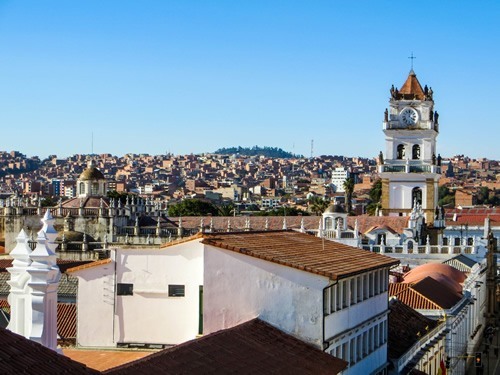
|
|
The skyline of Sucre, Bolivia, which the author called her home as a volunteer for seven months.
|
A row of welcoming, silent but encouraging faces were arranged before me; making the most of the somewhat sparse furnishings, my audience leant against the main table or chose one of the few chairs.
Some moments previously, they had asked me the most frightening question in my adult life: “Tell us about yourself, Stephanie.”
Well, to be more exact: “Preséntate, Stephanie.”
I had arrived in Sucre, the capital city of Bolivia, the previous afternoon. Keen to escape the clawing fingers of homesickness, I had thrown myself into my first day of volunteering work with the charity BiblioWorks, a U.S. founded NGO committed to improving educational opportunities in rural Bolivia by establishing and running community libraries.
Back in the comfortable surroundings of my parents’ living room in the UK, I had spent several months leisurely learning verbs (me gusta, quisiera, puedo), conversational expressions (¿Cómo te llamas? Me llamo Stephanie), and basic parts of speech which — I had naively assumed — would allow me to survive upon these foreign shores. But amidst this preparation, I had never anticipated that my new colleagues would want me to introduce myself.
In Spanish, of course.
In front of everyone.
With the confidence of an ex-high school teacher who had stumbled her way through more ill-prepared lessons they she would care to admit, I started speaking. A thick cloud of Spanish words emerged, some slipping from my tongue with surprising fluidity, while others dislodged themselves from somewhere around my back teeth and dropped awkwardly out of my mouth. Each word hung before me, evidence to my eagerly listening colleagues that the “intermediate” level of Spanish I had promised on my application form had been a little optimistic.
Las palabras dried up and were replaced with a forced smile.
My colleagues clapped; they smiled; they gave hugs and warm words. I’m pretty sure that no one — not even me — really understood what I had said.
Living as a Volunteer in Sucre
And so began my seven months of volunteering. Each day I would leave my small rented room in a Bolivian family’s house, bracing myself for the chaos of bodies on the pavement as I approached the center of the city, finding myself too close for comfort to the squealing of wheels, as buses dove furiously into gaps between cars on the poorly tarmacked roads, avoiding collisions of dented metal by a mere whisker.
Surviving the bedlam, I would pass through Sucre’s glorious streets: flanked by the white, colonial buildings — a lingering symbol of the conquistadores — which were crowned with tiles of burnt umber that seemed to match perfectly the fierce orange of the Andean sun.
Sending a cloud of pigeons blossoming into the air, I would cross through Plaza 25 de Mayo, where grimy street children clutched desperately to small bags of bird seed they attempted to sell to passers-by. Their dirty faces and threadbare clothing made them better suited to the side streets. Set against the fountains and diligently arranged flower beds of the UNESCO World Heritage square, the sight of these street children was incongruous.
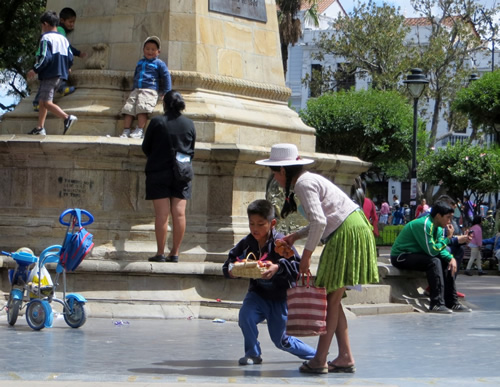
|
|
Working children at the Plaza 25 de Mayo in Sucre.
|
Bolivian Hospitality
Perhaps picking up a stray dog or two to accompany me on the final few blocks to the office, I would pass the small family tiendas that were the only thing open at that hour, pausing at the bakery to buy a few bread rolls for the customary morning snack for myself and my colleagues, before passing through the great gates of the building where we rented a couple of rooms, and taking the metal stairs up to the first floor.
The day would be spent answering emails from potential volunteers or meeting with those who had arrived to work in a library, posting updates on the organization Facebook page, and attempting to make myself of use to Bea, Silvana and Gladys with the only method I knew how: constantly offering to make cups of tea and coffee. How very British of me.
At 10 a.m., we would often draw around the kettle, and these morning encounters — often with bread rolls and jam, or, if someone had thought to buy them, delicious salteñas (pastry casings filled with meat and vegetables in a thick gravy) — were my first opportunities to get to know my new friends.
Over a mug of coca mate (the ubiquitous Andean tea made from the leaves of the coca plant), I would learn about their lives: how Silvana lived with her two sons after separating from her husband. Now there was a boyfriend on the scene; she spoke about him with a girlish laugh and a coy smile. Bea would talk about her family who lived over eight hours away in a small village in the South. She could only visit if she had a long weekend to travel. Gladys was very active in her local church and would recount stories about the events they held, or discuss the importance of her faith. Both in their late 20s and unmarried, neither Bea nor Gladys had conformed to the expectations of marriage and childrearing that so defiantly governs women’s lives in Bolivia.
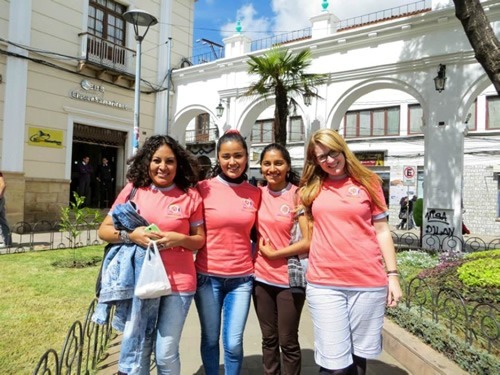
|
|
With the author's hospitable Biblioworks colleagues in Sucre.
|
My own attempts at communication, comprising the little I managed to convey about my family and my life as a teacher back in England, added to this sharing of gossip and titbits of life every morning. I loved how Silvana — the boss, and often leader of these conversations — would call me “Stephy!” and delight in teasing me about whether I’d yet met any Bolivian men who might tempt me to stay in the country for good.
Overcoming the Language Barrier
But that first morning’s unintelligible introduction set the scene for the rest of my time in Sucre. There would always be so much warmth from my colleagues and the other Bolivians whom I would come to know, but still, there would be the language barrier. It might have been cushioned by gentle smiles and kind words, but it was a barrier nonetheless.
As someone who has never before had an issue with a lack of confidence (five years beneath the watchful eyes of countless high school students does much to harden any skin), it was a jolting realization that I was alone in the confines of my own language — one so barely spoken here — rendering me, at times, almost mute in this new country. I knew that this crippling lack of confidence would be the psychological barrier to becoming more than just a casual tourist or observer in Bolivia, and was determined to overcome my limitations.
Life as an Independent Woman in Bolivia
So at 4 p.m. every afternoon, I would bid goodbye to the girls (using whatever new vocabulary I had learned the previous day) and head to my Spanish lesson. At this hour, the streets would be filled with traditionally-dressed women laying out the versatile Andean aguaho (a multi-colored, weaved cloth used as anything from blanket to backpack) to showcase fruits, vegetables, or bread for sale. Immaculately dressed, their plaited hair would hang from beneath the wide, round-brimmed sombreros unique to the Chuquisaca region of Bolivia, and multiple, beautifully stitched polleras (indigenous skirts, often layered to keep out the high-altitude chill of the Bolivian Altiplano) fell below; the gap between the rubber hojotas (sandals) and knees covered with thick, alpaca wool socks.
Weaving between these makeshift stalls and the unending chaos of the roads as micros and cars fought for tarmac, I would finally pass through the doors of the café where I would meet Veronica.
A lawyer and Spanish teacher on the side, she was perhaps the most fashionable women I ever met in Bolivia: she would arrive to classes with her faux leather handbag hanging elegantly from her wrist, her outfit linked to the “latest” trends from the States, which had trickled to this corner of South America. She was as alien to the dictates of Bolivian fashion and traditional clothing as I was, and her position as a well-educated women in what remained a male profession helped forge a greater bond than just teacher and student.
Although our classes helped me to overcome fears of a new tongue, and so brought me closer to communicating with colleagues, I came to see how that invisible wall between me — a blonde, independent foreigner among a sea of black-haired, convention-adhering Bolivians — was more impermeable than I had previously assumed.
In a culture where women exist as housewives and mothers, finding ways to meet other young women were few and far between. Although Bea, Gladys, and now Silvana deviated in some respects from these traditional roles, they were still forced to conform to some of the dictates of Bolivian society. My independence and status as foreigner allowed me to frequent bars alone or with male foreign friends, behavior that was alien to their culture. But, I quickly learned that invitations by locals to join my activities, that to me were so normal, were declined. Never having traveled beyond the borders of their homeland, I don’t think they realized that an invitation into their homes — their lives — was what I craved the most. Yes, I had “gringo” friends, but what I yearned for more than anything was acceptance, a small admission, into their world.
Veronica helped me begin to understand and begin to immerse myself in Bolivian culture considerably. She was honest about Bolivia and the multitude of problems it continues to face: she would talk to me about the corruption inherent in the legal profession, where exams to become a lawyer are often bought rather than earned. At other times, she would regale me with tales of Bolivia’s history and culture, including the area in the north of the country where a ritual to encourage a good harvest annually sees two towns come together to fight and settle scores from the previous year. The ruckus only ends once blood has been shed and this sacrifice serves to satisfy Pachamama (the Andean name for Mother Earth) and secure her blessing for the coming year’s crops.
Veronica wove a spellbinding web about her country and its history, never shying away from a refreshing openness about its issues, complexities, and inequalities, but helping me to fall in love with this strange, baffling place.
The Charms of Rural Life Outside of Sucre
As the months passed, one of the things I loved most about my time working for the charity was the chances it offered to discover Bolivian life outside of the city. While Sucre’s UNESCO charm failed to conceal the poverty beneath (you only had to pass the market early in the morning to see the young children sleeping in cardboard boxes there), its allure for the few tourists who pass through Bolivia had morphed it into something less authentic than the tiny rural villages surrounding the capital.
Taking a trufi (a small mini-bus crammed full of passengers and often with small children being dangled out of the window to vomit), the beautiful streets of central Sucre would melt away, being replaced by dusty, sun-bleached mountains careering off into sudden drops, where tiny, one-room, mahogany adobe buildings with tin roofs, and a small herd of cows, lined the valley floor.
I was certainly more “foreign” outside of the city, where locals’ interactions with tourists or outsiders were based upon their familiarity with volunteers who had lived in their village and taught in their library. But what always struck me was their kindness: despite their own abject poverty, they were always welcoming and keen to make me feel comfortable. It’s said that the poorest are those who give most freely, and this was certainly the case in the Bolivian campo.
One place I visited a number of times during my time as a volunteer was the village of Morada K’asa, the location of the initial BiblioWorks library. With fewer than 1,000 inhabitants inhabiting a handful of dusty streets, it proffers a vision of life in Bolivia as it has always been. The locals are subsistence farmers, whose wives blend into the collection of cholitas in the markets in Sucre if they have any surplus to sell. With the majority of the older population only speaking the indigenous language Quechua, few opportunities exist for locals apart from rural life. Only in recent years have local children had access to an education enabling them to move to Sucre and study at the university.
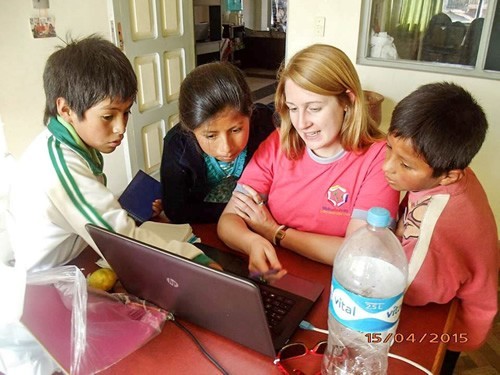
|
|
Teaching entralled children while with Biblioworks.
|
It was a great irony that in Morada K’asa the prevalence of Quechua meant that my painstakingly learned Spanish was redundant, and yet I felt more accepted and integrated into the community then anywhere in Sucre.
One day, I was invited with Silvana to attend a graduation ceremony or promocion to celebrate the youth in the village completing their studies. In a country where the gap between educational opportunities and the subsequent options for rural and urban communities to create a new life remains vast, this was a proudly celebrated feat. After the formal ceremony, I was encouraged onto the makeshift “dance floor” in one family’s back garden, and force-fed quantities of chicha (a fermented maize alcoholic drink) and té con té (the local spirit singani mixed with hot tea).
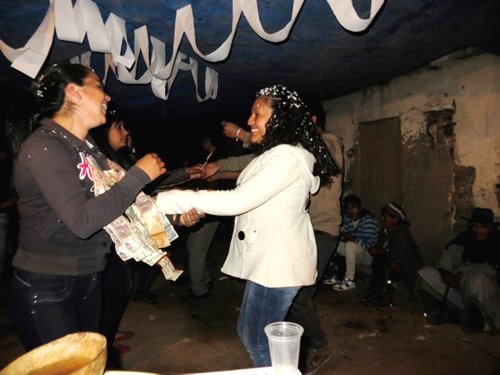
|
|
At a High school graduation celebration.
|
Another time, I took on the role of translator at a community meeting to discuss a new project which had been proposed by a volunteer from the States: a cooperative, sustainable farm which would encourage the growth of vegetables and a diversification of their basic diet.
Sitting on hand-built chairs and with a stray dog gently snoring beneath the table, I embarked upon my most formal Spanish to explain the idea of the project, with Silvana filling in the gaps. One of the village’s leaders, Don Donito, then translated my questionable Spanish into Quechua for the assembled audience. The whole process went back and forth a number of times following queries on each side, and goodness knows what was lost in translation.
Every one of these interactions with the beneficiaries of the charity, albeit fogged by the haze of miscommunication and separate languages, brought me closer to an understanding of the country. By this point, I was head over heels in love with Bolivia. There was a simplicity in the campo, and yet the communities worked alongside one another, listened to one another, and acted for the greater good. I often felt that there were many lessons that our more “developed” democratic systems could learn from these people.
Television Appearances
Throughout my months in Sucre, I had plodded along diligently with my Language Learning and so it felt fitting that one of my final duties for the charity would be to help promote the highlight of our calendar: the Reading Festival. In a country where books are at a premium, where I never once saw anyone reading, the event sought to reach thousands of children in the city, offering literacy activities and gifting books.
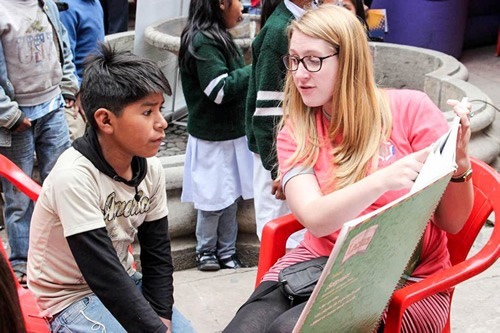
|
|
The author at the Reading Festival in Sucre.
|
My role in the promotion would take the form of live interviews on local television and radio stations. I was terrified, but I knew it would be a powerful, personal marker of the distance I’d traveled since that initial introduction in the office many months previously.
I’ll never forget being ushered into the “studio” at Canal Dos — a small room in a converted house which had been dressed as a living room. Similarly to that first time my Spanish was put on the spot, I was aware of the eyes of the technical assistants boring down on me, and even more conscious of the thousands more watching through the small lens of the camera. Silvana’s charisma and warmth dealt with the initial questions, while my hesitating attempts at coherent Spanish, complete with a look of absolute terror, were — I hoped — sufficient to at least be endearing to the viewers.
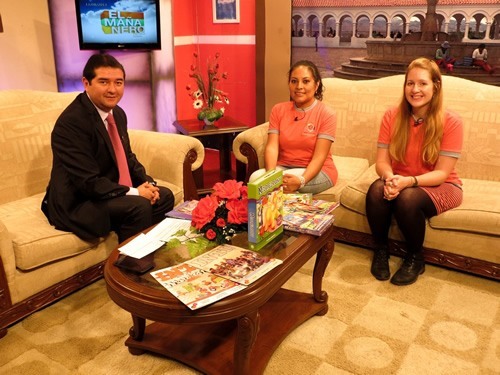
|
|
The author being interviewed in a television studio in Bolivia.
|
I certainly felt triumphant as we left and I began to enjoy myself the next few times I was interviewed. But it became apparent that you can never reach an absolute victory when it comes to learning a language, nor integrating into a country. That day was a false ending. A year later, I’ve realized that it’s a process, not a battle: a lifetime of committed learning rather than a single lesson.
I can’t say that I ever felt I became part of Bolivia, or integrated very successful into life there. But as I plan a visit back to the country after a year of absence, I hope that my fluency in Spanish will at least help me to approach those barriers with more confidence. I’m looking forward to the surprise on my friends’ faces as I can now regale them with tales of my travels since leaving the city. More importantly, I hope that, while the wall will inevitably remain as concrete as before, I might persuade someone on the other side to remove a brick or two.
|
Interested in Volunteering in Bolivia?
Here are some suggested websites to get you started:
If like me, you want to work with small, grass-roots organizations, Volunteer South America is a fantastic resource. With a list of charities operating in Bolivia (and throughout the continent), you’re guaranteed to encounter volunteering projects that suit your skill set. They also recommend that you commit to a decent period of time (i.e. at least a month, if not significantly more) to not only have a greater impact in your work, but to have a chance of learning more about the country and its customs.
Workaway and Helpx are other websites with a growing list of hosts seeking volunteers in return for bed and board. Although mainly focused on farming or the occasional hostel, these are a great way of encountering Bolivian culture.
As I’ve demonstrated, learning Spanish can have a massive impact on your experiences in Bolivia, so events such as the language exchange Parlana (held weekly in La Paz, Cochabamba, and Santa Cruz) are an ideal way of overcoming these barriers. Set in an informal bar setting, this event always gives ample chances to practice Spanish and make local friends.
|
Steph Dyson is a travel writer and volunteer who advocates slow, adventurous travel. Since 2014, she has been living, volunteering, and simply breathing everything that is South America. Find her at WorldlyAdventurer.com.
|
